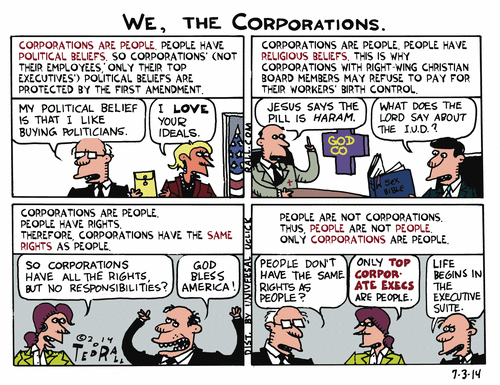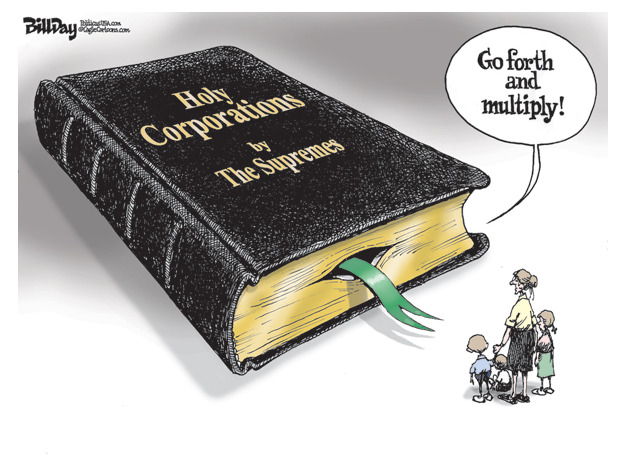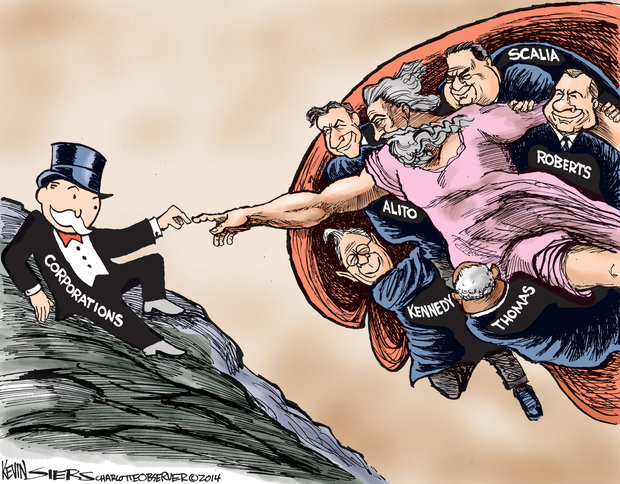What’s Wrong Today:
“If it ain’t broke, fix it until it is.”
This saying has been around for about 20 years. According to Barry Popik, “If it ain’t broke, fix it anyway” was first cited in print in May, 1993 in the Virginia Pilot by Jerry Alley.
The sentiment applies to the Supreme Court now that the Hobby Lobby decision’s slippery slope reasoning is out there being reviewed by lawyers. On July 3rd, just three days after Mr. Justice Alito issued his decision, lawyers for two Guantanamo Bay detainees filed motions asking the DC District Court to intervene after the prison’s military authorities prevented them from praying communally during Ramadan, a holy month for Muslims. The banning of communal prayers at Guantanamo is one of a series of recent measures against detainees who are on hunger strikes.
The lawyers argued that, in light of the Supreme Court’s recent Hobby Lobby decision, the detainees’ rights are protected under the Religious Freedom Restoration Act (RFRA). Requests for Temporary Restraining Orders were filed this week with the Washington DC district court on behalf of Emad Hassan of Yemen and Ahmed Rabbani of Pakistan. The filings were made by a UK-based human rights group Reprieve.
The detainees’ lawyers said courts have previously concluded that Guantanamo detainees do not have religious free exercise rights because they are not persons within the scope of the RFRA, but the lawyers now argue that the Hobby Lobby decision changes that:
Hobby Lobby makes clear that all persons – human and corporate, citizen and foreigner, resident and alien – enjoy the special religious free exercise protections of the RFRA
Which is exactly what Mr. Justice Alito said in his ruling. Despite his claim that it was a narrow ruling, the ruling itself is big enough to drive a truck through. Meet the truck, folks.
More from Cori Crider, an attorney for the detainees and a director at Reprieve:
Why are the authorities at Guantanamo Bay seeking to punish detainees for hunger striking by curtailing their right to pray? If, under our law, Hobby Lobby is a ‘person’ with a right to religious freedom, surely Gitmo detainees are people too
This is one of the unintended consequences from the Hobby Lobby decision: While the owners of Hobby Lobby certainly did not have Gitmo detainees in mind when they took Obamacare to court, it’s clear the ruling has become far bigger than its original purpose. Citizens United argued that “corporations are people,” Hobby Lobby focuses on religious rights and the idea that the government cannot force those corporate people to do things that are against their beliefs.
That could mean anything from refusing to teach evolution in school to ignoring laws designed to prevent discriminatory hiring practices against LGBT people.
The Defense Department did not directly address whether the men were being punished for their hunger strike. US Army Lt. Col. Myles B. Caggins III:
We are committed to religious freedoms and practices for the detainees, keeping in mind the overall goal of security and safety for detainees and staff
The overriding question is if the RFRA is compatible with the First Amendment. It seems to create a special privilege for religious groups that are not enjoyed by anyone else. How is this not itself an establishment of religion? If corporations can say: “but, it is against my religion” to escape the equal application of the laws, isn’t that a special right being bestowed based on religious belief?
Having the Supreme Court actually expand the RFRA beyond the protections put in place by the First Amendment only compounds the problem. Writing new rules to create certain forms of religious privilege seems dubious at best.
Try this thought experiment: Imagine atheists who have a family-owned corporation. Call them the Browns. They hold exactly the same views of birth control and abortion as the Greens, but their beliefs are based on their personal moral views, and not on any religious teaching. Would they be exempt from this mandate?
This isn’t Ms. Justice Ginsburg’s slippery slope, it’s a cliff.
The Supremes have now defined religious freedom not in terms of our own behavior but in terms of our ability to control the behavior of others. The Supreme Court just ruled in favor of more Corporate power, not religious freedom.





